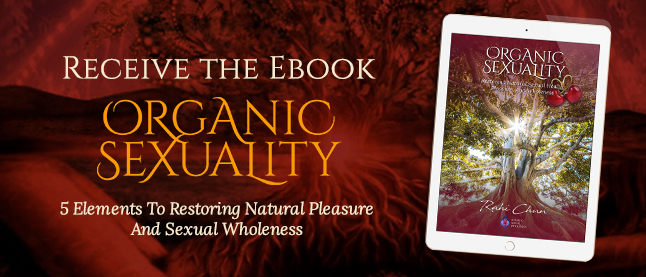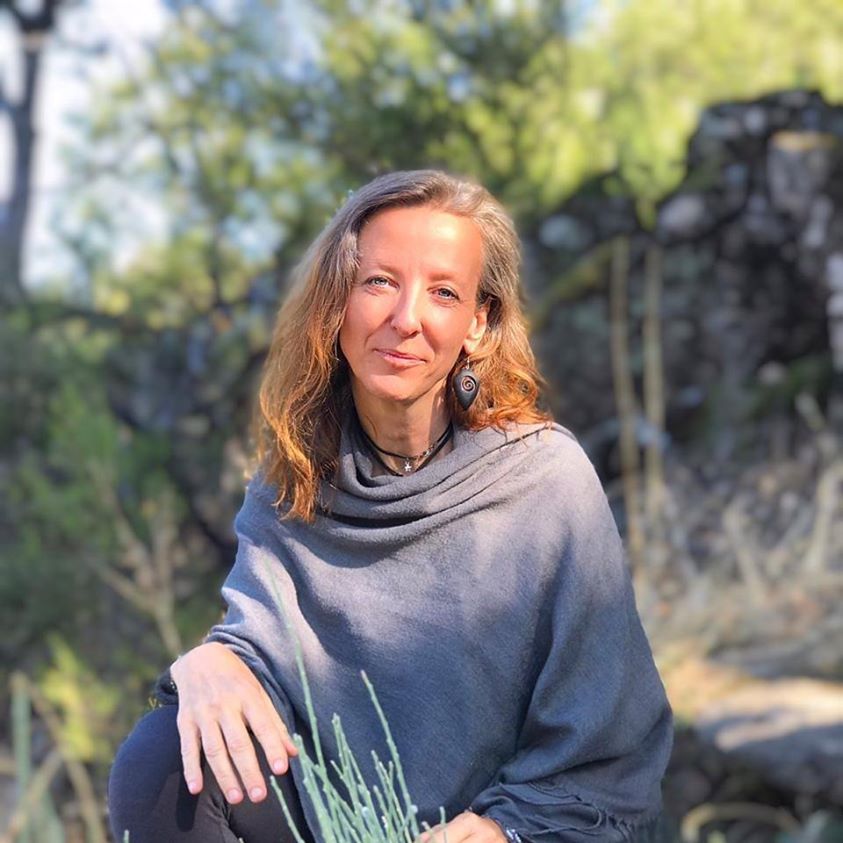
How Genital Armour Develops, Affects Our Sexuality, and Resolves from the Body with Susanne Roursgaard
Share this episode:
I first came to know Susanne via an online interview where she shared a somatic practice for waking up the tissues and sensory receptors of a de-sensitized cervix by having the cervical tissues engage and explore the sensations of one’s finger, rather than having the finger explore its touch of the cervix. (She guides this exercise near the end of our podcast.) Upon learning of her unique expertise as a mid-wife, sexologist, and psychotherapist, I was inspired to participate in an 11-day dearmouring training she was co-facilitating at Angbacka, Sweden, with the wonderful group Dearmouring Arts. I’m glad to have enjoyed keeping in touch over the years, sharing insights of our respective work, and witnessing the evolution of The Gaia Method she has co-created with her beloved partner Adam. Susanne’s depth of experiences and wisdom with genital dearmoring is always fun and fascinating to explore.
Today’s Guest:
Susanne Roursgaard, creator and founder of The Gaia Method (since 2010), has decades of experience as a practitioner, therapist, teacher and workshop leader. With her passion for helping others to feel freedom, safety, boundaries, joy, compassion and love, she is dedicated to bringing healing and trauma release to her clients – to feel natural sensitivity and pleasure in the body, to feel alive, to be at home in their body and to have peace of mind. In essence, to help people discover who they really are.
Susanne is and has always been very curious, wanting to know and understand life. This has lead to a variety of education as a Psychotherapist, Body-oriented Trauma Therapist, Sexologist specializing in Sexual Abuse, Family Therapist, Couples Counsellor, Interspiritual trainer, certified TRE-provider, and last but not least, her medical background working as a Danish Midwife for 23 years.
Susanne was born in Denmark, now living more around the world than any specific place. Her bases are The Netherlands and Denmark. She is a mother of 2 children, both young adults now.
Susanne is now sharing her life, her path and work with her beloved Adam Beker. She is a Shamanic and Tantric practitioner with a committed meditation practice.
We Explore:
“Slow is the fastest way…”.
How Susanne’s path as a mid-wife working with clients with a history of sexual abuse led her to becoming a sexologist and develop a specialty for Genital De Armouring.
How up to 80% of sexual armour is from early childhood experiences – before age 7.
How pregnancy and childbirth can invite triggering experiences reminding the body of past sexual violations.
How completing the energetic interruption of unintentional C-sections can be facilitated via the cervix.
How boredom and frustration during sexual intimacy can be a reflection of genital armour.
How the body can respond to arousal stimuli physiologically, yet not receive embodied pleasure, and how permission and conviction can be the keys for their resolution.
How “being with what is” – without imposing any outer agenda onto the body, can be the medicine inviting the body’s trust and responsiveness to return.
Rahi: Welcome to organic sexuality, where we explore the restoration of pleasure, the reclamation of sexual sovereignty and the realization of our embodied sexual nature. An invitation to honor the pleasures of your body by embodying the pleasures of your nature. I'm your host, Rahi Chun. I'm a certified somatic sex educator, sexological body worker and creator of somatic sexual wholeness. In this episode, we explore genital armoring - how unconscious guarding patterns can show up as pain, numbness, discomfort, or a lack of sensation in the genitalia. How much of our adult pelvic armor forms during our childhood years, and what's required to release this safely and effectively for restored pleasure and wholeness?. At the end of the episode, Susanne leads us through somatic exercise for waking up and engaging previously disconnected tissue from within the genitalia and pelvis. Rahi: I am thrilled today to be inviting Susanne Roursgaard, who I just admire and appreciate so much in our world. She has such both a depth and a breadth of experiences that address the whole body and the whole person. So a little background about Susanne: She is a psychotherapist, a body-based trauma therapist, a sexologist specializing in sexual abuse. She's also a family and couples therapist and inter spiritual trainer and has been a midwife for 23 years. And so, she has synthesized and synergized her decades of experience into her body of work called The Gaia Method, which is so holistic and complete. And it's so beautiful in the ways The Gaia Method holds that sacred space for inviting us to return to our essence. Suzanne, thank you so much for being here. Susanne: Thank you for inviting me. Rahi: Yes, so Susanne given the depth of your experiences in both somatic and trauma based therapies, as a sexologist, as a psychotherapist, um, there's so much we can cover, but I really I'd like to focus on, specifically Dearmoring and specifically, genital dearmouring. So to start off, I would love to ask you Suzanne, how your path led you to your experiences in holding space for genital dearmouring? Susanne: Well, it started when I was a midwife with me often experiencing that pregnant women, birthing women clearly gave signs, body signs, or even came to memories of sexual abuse. And I knew nothing of it. I didn't know how to hold space for it. And it was not part of the medical training, uh, within obstetrics. Um, so I decided that I needed to know more about that because I, I met a lot of women. Uh, we're not talking a few percentages. We're talking somewhere between 25, 45% of all the women I would get in contact with would actually display symptoms or behavior that equals that there is some sort of sexual abuse or incest, or maybe even rape that that is hidden in their system, or they haven't shared it, maybe with us. Some of them don't know. So I decided to become a sexologist and specialized then in sexual abuse, incest, rape, because of me meeting them, uh, in the hospitals and really not knowing how do you work with them once they are, you know, pregnant and giving birth and why do they react so strongly to the sexual abuse when they're in this, um, state of life? Susanne: So that was sort of my, my way into to starting to discover this. And then, I ended up becoming quite a cognitive sexologist. Um, having a lot of people refer to me from others. Um, and, some of the ones that I would get referred to would be to me would be someone that had been in therapy for like 25 years. And they would come to me and they would speak about their story - like they were talking about laundry, you know, they were completely unaffected. And I was like, there's nothing I can do with these people. And at that time in my life, I've been in my spare time following a tantric and a shamanic path where you do a lot of - let's call it alternative ways of working - at least viewed from a more normal cognitive, um, medical system. Susanne: So I had one client, especially that was say, let's call it my, my point of no return. Uh, that came to me. And she was talking about really, really severe sexual abuse throughout her whole childhood. Like it was nothing. And, uh, and she ended in therapy for so many years. I was like, I can't do anything with her. And I just sense that her body was screaming for help. So I asked her, okay, you seem to have spoken enough about this. Has anyone ever addressed your body? And then she completely broke down and said, I just heard the biggest YES finally inside of me. So I told her that we can do experimental treatment that I normally don't do in my professional life, but I'm used to working with this in my own communities. And there, we have really good results with working with various kinds of sexual trauma, sexual numbness, um, disconnectedness, whatever it is, uh, through what you would call genital dearmoring. Susanne: And, um, that then led to her saying, yes, please. I would love to have a session. So she came for a session and this woman was married for 17 years already. And she was sexually active with her husband, but she was completely numb, meaning that she felt nothing in her genitals when she would have intercourse, what she felt and enjoyed about being sexual with her partner was the heart connection. The love. She could feel that they were sharing and the joy and the happiness that she saw in him because she allowed him to share her body. So after a week of the first session, she called me and she said, Susanne - did you know that it feels good to have a penis inside of you. And I told her, yeah, I do know. She was like, can I have the next session? So she got the next session. Susanne: And after her second session, she called me and said, my partner thinks I've had an orgasm. What do you think? So she described it and say, yeah, that sounds like that could have been an orgasm. And within three months, all the women that was in herself health group for incest started calling me and say, Hey, you've been working with our friend and, you know, could you work with me too? And then gradually, that was my way into it. But in the beginning, I truly only worked with sexual trauma, sexual dearmouring, and then later on, uh, I expanded that because trauma is trauma when it comes to the body. So you can have things stored in your genitals, even though it's not a sexual trauma, it's another type of blockage that sits in that area of the body. But my way into it was through my,, being specialized within sexual abuse. Susanne: And then gradually people that weren't sexually abused started calling me and say, Hey, we hear about your work. I'm not sexually abused, but I have this problem. Do you think you could work with me? And everybody got the same song it's going to be experimental. I can't promise you anything. It's sort of outside the system and you have to be aware. I don't promise you anything, but if you're willing to, to explore, then I'm willing to do this with you. And yeah. And then over 10 years, it developed into becoming the Gaia method gradually. So that's sort of my way in. Rahi: That's so beautiful. I love that. Um, I wanna, I wanna take a moment to really explain a little bit about how armoring can form in the pelvis and the genitalia - really anywhere in the body and going back to your first experimental client, 17 years in a marriage, that after that one session,, I think you shared with me before that she was someone who had a history of, of sexual violation - severely. And I want to touch on the degrees to which our tissues hold on to unintegrated emotions, and how restoring sensation in the tissues is like a gateway for releasing those past, unintegrated emotions and trauma. Susanne: I mean, they're, we often people think of trauma as being a mental thing. And that's a very, very big misunderstanding because trauma is something that happens to the body and the mind might remember it, but it might not, but your body always remember it. So, so that means that the trauma is actually a physical experience in the body that will sit as you can call it memory residues that is sitting in the actual tissue in your nervous pathways, in the cells. And typically when, when we experience trauma and I really mean trauma in a very broad sense, because trauma can be these one time, big incidents, where it's very big and extreme what happens to you, but that is not the type of trauma you will find the most of. Most of the trauma we find in the body is what you could call developmental trauma, meaning that - that's all the times throughout your, your childhood. Susanne: When you grew up, when you were not met, seen, treated, respected, uh, handled the way you actually needed it. And where are you again and again, basically had to defragmentize a part of yourself by closing elements down of yourself. And part of that can then resolve in numbness in the tissue because you've completely disconnected to this area of the tissue. The tissue is still sensing, but the signaling to your conscious mind and your brain about what's happening is not there anymore. So it's a disconnect inside the system. It's not really because the nervous system is broken. It's just not communicating with you anymore so you can pick it up. Or it could be the other way where the body gets hyper-sensitive - where it's so alert to not have this happen again, that it, the tiniest little thing will then be sending a signal to your brain like, Ooh, danger, danger, it's painful. Susanne: You're damaging yourself. So even the slightest little touch can feel like people are stopping you or pushing really hard. And it creates pain that is not in proportion to the kind of action, the touch that you were actually just exposed to. And there's so many things that can add to trauma in the body and this body armor. And one of the things is, like I said, when you're not treated the way you needed to, or if you have one of these extreme one-time incidents that could be a severe traffic accident, it could be, you know, um, you had earthquake big time, earthquake, you know, things that are tsunamis things where you're like, okay, this is violent. This is big. And it's typically out of your control, it's happening, but it's not something that keeps repeating. Whereas if you are growing up in a, let's say a dysfunctional family, or just a family that don't get you. Susanne: See you for who you are, then you will have the same thing repeated again and again and again. So even if the actual thing that has happened to you seems like it's just a little thing, but it's little thing times a thousand times, 10,000. And that means it builds gradually to not being this little thing anymore. And so elements of what blocks inside your system is from what's happened to you done by others. But then there's the type of body armor that is created by our own way of treating ourselves - such as not respecting our boundaries, uh, pleasing others, even if we cross our boundaries, because we are afraid of not belonging to the group, not being accepted and being, you know, so we do a lot of things ourselves as well that creates armor. A classic one for women is, when we talk about genital armor is when you are even in a loving relationship with a partner you love dearly. Susanne: Maybe he feels like having intercourse a little more often than you do. And you notice, Oh, it's two weeks ago when he starting to be like a little, you know, grumpy and you sense, okay, he's, he wants to go there, but basically you don't really want to go there. And maybe you notice when he gets a little itchy, he starts also being annoyed with the kids easier. And you're like, Oh, I don't want it to harm them. And the woman might be like, yeah. And you know, I do enjoy it. Once we start, it's just the starting, I can't get myself to it. But, you know, once we start, you know, five, 10, 15 minutes down the road, I'm just as much into it as him. And then you, as a woman, decide to interact and maybe be penetrated with the penis inside at a moment where your body is actually still saying no, no, no, I'm not there. Susanne: So no partner has been violating you. You've been inviting it in out of a lot of, taking care of other people's needs and basically putting yourself and your own need lower to, you know, I wanna, I, I love him. I want to show him, you know, you're important. So, you know, I'll get there and this, these kinds of behaviors that are, I think most women that are in longer relationships, they have experienced this at least once where they weren't really there, but then, uh, okay. You know, I'll get myself there, but these type of actions that we do ourselves, they can actually create armor as well and can create pain or numbness. Rahi: So, um, there's a lot of great, great things that you shared here. I, I feel like what I'm hearing is every little contraction within the body and the body's tissue really accumulates and adds up and can start to create that armor really anywhere in the body. But our genitalia is so sensitive and such a vulnerable part of our body that, um, the armor that can build within the genitalia for a woman or a man, um, it doesn't necessarily have to do with just a violent penetration of, uh, breach of boundaries. It can happen within loving relationships with each contraction or resistance that is overrun by the body's owner by just succumbing or wanting to please. Um, and, and by the way, this can happen within men too, whose libido is less than their partner and they feel obligated or forced to engage. And then they start feeling disconnected from their own genitalia. Susanne: And, and then there's, there's another aspect to it. And that is once you start working with sexual, dearmoring, my estimate is that with everybody I work with with sexual dearmouring, 80% of what we are actually healing and dealing with is early childhood things. It's from before the age of seven. It's often when they're two, three, four, five years old, and I wasn't good enough. I wasn't the good boy or the good girl. I was, you know, too slow, too much, too little, um, not lovable. Many of these negative self voices that many of us have deep within, even though we might try not to let people know we have them, but that negative self voice very often is actually located physically within the genital region or the pelvis region. And I can't say if it's true, but there's a Norwegian, sexologist and psychologist that worked a lot with children. Susanne: And he did some research that actually showed that by the age of seven. Uh, he did research on children by the age of seven. A lot of children already had very intense, chronic tension within the genital and pelvic regions that was stemming from these small things with dysfunctional things in the family. But very much with this, I'm not good enough, you know, I'm not sweet enough, I'm too much, or nobody loves me. Uh, so, so those are often things that when we start working with the genital dearmouring, even if, if, if the client came to you because they want to work with their sexuality, it's not rare that it turns out that that thing in their sexuality actually stems all the way back to this little inner child, not feeling, you know, loved or good enough or appreciated, or well, maybe simply feels like I'm too much or I'm not entitled for anything - not worth it. They're definitely there. So it's a misconception again, if we think that sexual dearmouring equals we're going to work with sexual issues, we can be working with deep, systemic, low self-worth issues. Rahi: Yeah. Yeah. I find that actually, so many, just as you're saying, Suzanne, so many of the sexual issues that clients come in with are actually kind of life issues. And as you say, that can be threaded back all the way to childhood and the early formation of one's sense of self-worth and identity. It makes so much sense to me that the Norwegian sexologist discovered this because, um, you know, that sense of belonging, we feel in that sense of security within the pelvis. And of course that's where the psoas muscle is as well. Um, as well as you know, who knows what gets passed down from our parents through first contact with our genitalia and potty training and our first exposure to playing with our genitals or self-pleasuring and discovering a relationship with that important part of our body, Susanne: A lot of shaming comes from there. And sometimes the shaming is, you know, that, that you were told by words, for a lot, it can even happen much, much earlier. Imagine you're a tiny little baby and you have a diaper on 24 seven, and that diaper never comes off unless you need to be changed because you either did number one or number two, and for a child that wants to touch themselves. And, Oh, it's just nice to get the hands down. If you're a little baby and finally the day becomes up and I want to have my hands down here and your mom or your dad is changing you for number two. So the parent will be diagnosed. Don't do that. Don't touch, but you are not aware of number two, being all over the place. And if you put your hands down there, you're going to get messy. Susanne: So if you were putting as a little child, your hands towards your genitals, because I just want to touch, it feels like it's calling me and now you get this very strong. No. So you actually get a shock saying hands do not belong there. And you might even get this feeling of I'm bad, I'm wrong because I wanted to do this. So, so even that can become a part of this feeling, shame about that area. And it stems from being diaper changed and your parents not realizing that, that them saying no, because they were afraid of the little one getting, you know, feces all over their hands. That actually when the child is coming from a completely different intent and doesn't know anything, then, then that's what is going to be effective in there. So if it goes really deep, Rahi: It goes really deep. Yeah. And you know, it, it makes me sad just hearing that because just recognizing how the pure innocence of a child and particularly a child's exploration and love of their sensations can get shamed and punished. Um, and again, there's that contraction within the nervous system, uh, not only of the anger, but of, you know, the threat of love being taken away by my caretaker and how that leads into our adolescent behavior and can lead into our adult behavior. So I want to come back to the genital armoring and really, because it is, they are, unintegrated emotions that live in our tissues and in your journey, holding space for genital Dearmoring, the role and, you know, it's all over The Gaia Method, just the role of the unconditional presence and inviting the story of the body to be told for that unintegrated emotion to release - how important that is in all dearmoring. I mean, I know you distinguish your dearmouring, as soft from kind of standard dearmouring. And I would love to hear how, just how you discovered, um, that unconditional presence and the soft dearmouring is, is far more effective. Susanne: I think, again, that, that part stems back to being a midwife. Whenever you work as a midwife and things aren't working, right, and, you know, you learn to have hands that are present - hands that are there, hands that are sort of leaning in - until the body lets it in. So part of that already was in my system from how we work. but also, because for me, it makes no sense that when, when you have armour in your body, you have armour, because there was some needs or a boundary that was overstepped, meaning something was pushed too far inside of you. So to me, it's never made any sense at all, that you would then use a technique of pushing too far to try to heal something that was pushed too far, because for me, that equals breaking down and you can break down armor, but that has a lot of issues, that sometimes, can surprise people afterwards with some, nothing happens other than it broke it down. Susanne: And it was very painful and left them yellow, green, black, and blue. Um, but with others, they actually get re-traumatized severely. So for me, it's also a question of whenever you want to heal trauma or heal, any unresolved, aspect of the person, that aspect is still in there. But that aspect is in hiding because I'm not welcome. I'm not allowed to be here. I'm not, I'm not invited to the table yet. So for me, it's very important that the whole approach is an approach of respect and inviting and knowing that a body holds immense wisdom, like our brain thinks it's wise? - not at all compared to a body. So it's also about trusting that if we're inviting something and it chooses not to come forward today, there's a good reason. And that reason can then be that this person needs to develop some skills first before he or she is ready to actually look at this problem or this history, or it could be that I have to look inward and realize that whatever is hidden in that emotion inside this person. Susanne: I, as a practitioner actually cannot be with that emotion myself. And then I cannot hold space for another one, the welcoming of that emotion and, and the wisdom of a client will be able to tune into that, that, - Oh, this person won't be able to handle my anger or my resent or my, you know, nasty words if that's what needs to come out. So, so it's, it's very much about this really inviting, accepting, welcoming that everything is welcome. Nothing is wrong and that all aspects and all parts of people need to be allowed to be part of the whole. It doesn't mean that a part needs to take over the whole, but it needs to be part of the whole so that all these fragmented parts - that we have had to reject, can come back in again. So, so, and the soft Susanne: touch - it allows the body and the nervous system to not have to go into self-defense against me, but if I start pushing really hard and I push beyond the pain threshold of a person, that body is going to, when we go into the primitive systems of fight, flight and freeze, those will get activated if I push too hard, because now that body will start to look at - Wow, this person is attacking me. This person is a threat. So what do I need to do? Oh, I need to tense up even more to withstand that pressure. And that means that, you know, whatever needs to come from within is not going to reach the surface because now the body is busy, basically defending itself. And then I would have to push harder and harder. And at some point we might break it down. But when we don't do that, it's sometimes can take with some, a little longer in the beginning because the body gets almost, if it's used to our harder handling, it almost gets a little confused, like, - Oh, she's just going to be patient. Susanne: Is she just going to sit there and wait,? -is she - nah, she can't be that loving because all the ones in my memory from my past, they would always, when I weren't fast enough, get angry with me. So sometimes the body will also in the beginning when you show it this soft, very inviting way, almost test your patients as a practitioner. Like, can you really stay loving and present still, even if I don't deliver. And when the body realizes that, Oh, actually I'm, I'm still being accepted - my speed is being accepted, then suddenly the body actually, dares stepping into co-creating with you, instead of being done to. So it becomes a co-creation between this holding the inviting space, uh, with, with lots of love and compassion and, you know, all, all those emotions that were absent when the fragmentation inside the person was created, that's basically what we're sort of providing, so that it can come forward and come into a present healing of receiving what was lacking in the past. Rahi: Yes, yes. Um, yeah, what I'm hearing is really the importance and necessity of meeting the tissues and the nervous system where the tissues and nervous system feel ready and safe to be met because we are reversing that reflexive self-defense response again, within the tissues and the nervous system and the important, I always, I often view, um, you know, understanding like what age a significant trauma happened. I feel like the tissue is that age, you know, feeling stuck or, yeah, it's still reliving that story. And so if it is a three-year-old, the three-year-old will test the adults around them to make sure that they're absolutely safe. Susanne: And also when you activate the tissue or for instance, uh, of wounding that was placed in the body when the person is three, very often, the, the person can go into a regression that, that time and their capacity and the ability of tools they can use within their own system equals the age of a three-year-old. So that's also why sometimes you might even ask the client, how old do you feel right now and days and would be like - It's weird, I feel like I'm three years old. Okay. That's tissue telling you how, how old were you actually, when this freeze came into your system. And then you want to meet it according to the age. Rahi: Yes. Yeah. Yeah. So we're, we're meeting it and, rewriting the story for that three-year-old - within the three-year-old's body - now in the body of an adult - that it, it can be safe, it can be seen, its voice can be heard, and it's safe to feel its natural sensations again. Um, Suzanne, I want to actually touch upon something you shared earlier about, you know, as a midwife, how you recognized the high percentage of trauma that was stored within the body of your clients. And I mean, given that, given your background as a psychotherapist, sexologist, and a midwife, you're kind of the perfect person to ask this, you know, when those unintegrated traumatic experiences are still held within the pelvis of a pregnant woman, the way that those, that those experiences and memories can be activated during the pregnancy, I'm guessing, especially the third trimester and the birthing itself, when those tissues are being touched into, in a way that may not have occurred since a violation or a past trauma. Um, yeah, I did the degree to which that happens or can happen. Susanne: I mean, the reason it can happen is because anytime you have a, an unwanted experience, let's call it that instead of trauma, but an unwanted experience that your body has memorized in a way where your body's like, I never want to experience this again. Then your body has also created triggers, memory triggers. And that means anything in, in the future, in the present moment that reminds you of these triggers will be enough to activate that old wound - And pregnancy and childbirth hold a lot of triggers that equals the trigger and, and the situation actually that you were in, especially if you have sexual trauma, which means that, um, being pregnant, it can be that, you know, there's something moving around inside your body and it's out of your control. And sometimes, you know, when you're in the third trimester, the baby can be kicking all over and you're tired. Susanne: You just all be quiet. Cause you know, my, my belly is like, I need a break, but you can't get the break. So that in itself can be this feeling of - I wanted to get out, but I couldn't. In childbirth it has to do with, especially when, when the head is born, the crowning of the head, uh, that type of pain, but in the reverse direction,, is similar to the pain a child would experience if an adult is penetrating them.. So the pain has so much resemblance to that memory of how the pain felt that it can trigger it and even breastfeeding can trigger as well. Because again, breastfeeding, you don't own your own body. You are on call whenever it fits the baby. And if you were abused, then you were on call whenever it fit your abuser. So, so you can have, you have a lot of situations that are triggers, which also means that you have a lot of women that actually don't even know they have had abuse until the triggers gets activated and the memory comes back. So yeah. Rahi: Yeah, I'm just, I only had one client I had came in, I think she was at 38 weeks, so she was safe to work on, but she was very intentional about wanting to release whatever emotions were within her, her vaginal canal, before the birth. Um, and she had a big baby and she feels like it really, really helped this. This brings us to Tova. I want to ask you about Tova. So, for our listeners, so Tova, uh, gave me permission to reference this story in the, dearmoring training at Angbacka, Sweden. Um, Tova went through an experience where, uh, through Suzanne's, uh, support and guidance was able to complete an energetic interruption within her body, during her birth giving when there was an unintentional C-section, um, Tove's great. She's healthy, she's a doula now and her baby is adorable, super healthy, but she had this, um, stuck energy. And I wanted to invite Suzanne to describe, um, what happens when there is an, an unintended C-section that occurs, especially when the, the parents are planning for natural childbirth and, um, what you did to facilitate the release of that energy. I found it fascinating Susanne: When you, like you say, when you have the intention of giving natural childbirth and you then for whatever reason ends up with a C-section or even the forceps. So the vacuum extraction where it's not natural anymore, uh, there is, for many women, especially this sensation or feeling afterwards of - I was a failure. I failed on something so fundamental for any woman to do - something I should have been able to. And for some women, it actually means that they get sort of a hate relationship to their body. Almost like their body deceived them. You didn't do what we were supposed to do. And then other times it can play into, if you already have a feeling like, you know, I'm never good at anything. And now you also failed your childbirth. So you can have this, um, deep sense of, of not being a real woman, because you couldn't manage what a real woman should have been able to. Susanne: And, and that considers a very deep wounding, and it's often a deep wounding that actually affects the connection between the child and the mother, even if on a physical level, the mother is doing all the right things with the child. You will often experience there's something energetically between the child and mother that is, it's not really there. And sometimes you can even experience that these children prefer their daddy over their mother, even though the mother was breastfeeding, but I still prefer my daddy, you know? And so, so, there is something that gets interrupted somehow. And when you do sexual dearmouring, uh, if there is any kind of birth trauma, whether it was a C-section or the forceps instead of, or the vacuum extraction, instead of natural birth, some women will experience that when we touch upon different areas of the inside tissue. Susanne: And especially, when we touch around the cervix, that suddenly they, they are, you know, moved back to the sensation of the childbirth. Like they feel like they have contractions or they feel like, Oh, it's almost like there's a child that, you know, should come out. And in that situation, you can go into an energetic birth rebirthing as I call it, but it's an energetic one, but it's an energetic one that is done in connection with the woman's sensation in her physical tissue. And what kind of images, what kind of sensations, what kind of thoughts and emotions that bring up in her system? So for the woman who, who enters this sensation of a rebirthing is starting energetically for her - it truly feels like this contraction. There's a baby - with her mind, she knows that's not the fact,, but this is how it feels in her body. Susanne: And in that, uh, position, we can simply go into childbirth, have her start pushing, have her, you know, grab your legs, pull them up, you know, if there's an extra helper or have them support her, you know, lift up and have her push. And as the practitioner, what you do is that you give just a little bit of resistance against the cervix so that she has something to push against. And at some point she will feel like, Whoa, it's crowning, it's coming out. And it will really feel like her. And you will typically see these mothers spontaneously, take their hands down and, you know, literally not do like this, but grab this invisible child, put it on their belly and really hold it, like there is something here and typically go into crying relief, joy - that totally looks like if you see a beautiful movie of natural childbirth, whether it's child comes out, you know, and the mother just, you know, blissfully cry from relief and happiness, and you can often see that coming and then right after that, Susanne: Sometimes then the deep grief from the birth that they've been carrying comes, comes as well. And, and the very interesting part is that I've, I've been doing these kind of rebirths so many times - I don't know how often anymore, but with the ones where there have been some disconnection to the child, it's never been, you know, they have a good connection, but it's never been, you know, what, they might, sometimes the mothers know from other children, they have there's an element lacking. And, and all of those that I've known that had that issue when they come home and they connect with the child immediately, - it's like, it was never there and that's even been when the children has been five years old, 11 years old, 14 years old, you know, 14 year old teenager that just constantly slams the door in the face of mother. Susanne: And, you know, it's just me. And then they come home after a rebirth like that. And suddenly the teenager doesn't slam the door and speaks nicely and come and sit down and say, - Hey, you want to hear what I did in school to them? The mother's like, what, where they share with me. I don't know what happened, but something in our, in the energetic connection has completely switched. So it's quite magical. I don't understand myself what's going on. Um, I know about, um, Oh, what's it called? Um, family constellations. And, and this is what it reminds me of the same kind of effect that you hear from family constellations. Uh, and, and what I've noticed also when I do these rebirthing is that it can only be done, uh, if, if the woman actually senses it, but it can be invited. So if I have women that know they have birth trauma, then when we start working internally, and especially when I'm addressing the cervix and working around the cervix at some point, then I will be holding the cervix and I will be asking them, could you please start pushing us? Susanne: push down. And then we see in very often, if they have an intention of going there and the body actually wants to go there, then just as often by doing this invitation, we will experience that it does start happening, even though it didn't open up by itself. But at some point the body also says, ah, it's not going to happen. But so sometimes we invite it to see is, is the body willing or not? But it is very beautiful. Rahi: Yeah. I mean, it was so beautiful. And, um, you know, Tova gave me a ride back to Stockholm after that training. And she was just feeling so different in her body. Uh, and as you know, her, her relationship with her daughter who was, I think about two at the time had changed, um, you know, what strikes me - what strikes me is recognizing once again, when there is an interruption of the organic life force, how the organic life force wants to expand in the in the body. So the cervix is like preparing for nine months, or maybe even longer to, you know, embody the sacred, you know, past the sacred birthing. And so it makes so much sense to me that when it's, you know, for medical - for whatever reasons the C-section occurs, the cervix is still in a yearning kind of incomplete stage. And that it, that those memories are that that sensation, uh, would still be held there in the tissues. Susanne: I mean, the, the whole body is preparing for birth. The, the many last months of the pregnancy, getting everything loose or softer, more ready to be able to expand and dissolve. And so definitely the body is preparing itself for this is the road we're supposed to go down and something is interrupted, uh, on a bodily level. Definitely. At least that's my take on it. Rahi: Yeah. You know, I want to just comment on cervical dearmouring for a moment, because I find that for, for most of my clients the cervix is quite armored when, when it's first made contact with, because I think most women, you know, certainly are penetrated before their bodies are ready, during their adolescence. And then all of the, you know, medical procedures that cervix has have to endure. Um, but within, you know, one session, it can really dearmour quite quickly and sensations can return. And then there's this whole, you know, almost like a part of their body they weren't connected to can, can reconnect. Yeah. Susanne: I, I think there's another element to it. And that is, I mean, the cervix is this hidden organ. It's not like a man where you, you sort of have to go pee and you have sort of a natural access physically to, to your genital where this part of the woman's body is so hidden up there. And definitely many countries, many religions do not teach women much about what they look like inside. So, so for many women, they are not even aware that this body part exists, which means that even on a emotional and mental level, you're not connected to it. It's like this non-existing part in there. And then for a lot of women, the only connection they have to it is that they have been, uh, having intercourse in a positions where there has been a bit too much, let's call it banging straight, directly on the cervix, which has been painful depending on where their cycle is. Susanne: So they also have this like, Ooh, there's something in there that can hurt. And that means they don't necessarily get this sensation that there's anything positive about the cervix, because nobody ever taught them and they didn't get to connect themselves with it. So I feel like many women, when we start working with sexual dearmouring -, they're actually on a discovery path of just starting to get a relationship with their cervix, to realize that this cervix is a magical gateway to immense types of orgasms and experiences that far, far overseed,, for instance, a clitoral orgasm. Um, so, so that's also part of it too, to even just embody that body part and realize, Whoa, there's a body part here that can do things and actually can increase the pleasure I, as a woman can can experience when I do choose to be sexual intimate, whether it's with yourself or a partner. Rahi: Yeah. I'm always amazed because I feel like it's, you know, amongst the most important aspects of a woman's sexual anatomy, as well, as you had mentioned, the vagus nerve goes all the way down to the cervix. So, the quality of orgasm is going to be full body, open the heart. It's going to be so other worldly. And yet I feel like we're in a, in a kind of stage where people are just discovering or just becoming educated about the sacredness of their cervix. Susanne: Definitely. But you can say that in general, around female genitals, I mean, it's only what 10 or 15 years ago that it was discovered, you know, the size of the clitoris.. And the shape of the clitoris - before that, you know, we didn't know anything about that. So there's been a tendency to not really from a medical point of view, having much interest, uh, in the female genitals. And then also, because most of the medical knowledge you had on female genitals was what doctors could discover from doing. Um, what's it called, um, autopsies on corpes and corpses do not open up and flower and close. And so a lot of the knowledge was based on not knowing how this live organ actually can, can really move a lot and move down and pull itself back up and, you know, almost have a life of its own. So, so those things are really only in the last one, two decades, that this is starting to come up at least in the Western world, because you can still find a lot of information if you go more towards the tantric, Asian, old knowledge about, uh, well, even the Quodoshka, um, native American, they seem to know much more about sexuality than, than let's call it the typical Western world. Susanne: We're only sort of catching up slowly now to, to the sacredness and, and yeah, the, the potential I would say. Rahi: Yeah, yeah, absolutely. It's endless the potential. Susanne: There's one thing I didn't get to mention when we talked armour that I would love to actually address because many women will be like, no, I'm not numb, so I don't have that kind of armor and I don't have pain - Oh, I don't have armor. Perfect. Then I sometimes ask them. So if you are, uh, sexually intimate with penetration, does it get boring within five to 15 minutes? A lot of women will be, yeah. You know, after 15, 10 minutes, you know, I do my little wiggle so we can get it over and done with - that is armor too. That is partial numbness. And a lot of women do not even know that - that boredom when you are being, you know, whether it's massage touched or, or being intimate, uh, physically, if you get bored after a short period of time, that is actually also armor because you're not receiving all the, the expanding pleasure signals. Your body is just not armored with numbness immediately. It just shuts down gradually after you started. So, so a lot of women know that one that, Oh, yeah, it gets a little boring off the five, 10, 15 minutes, and that's partial numbness and it's also harmful. And it can all come to life, like you said, and it's, it's really just about addressing it - giving it attention and staying with it and meeting it and touching it softly. Rahi: Yeah. I'd love to touch this phenomenon that you, that you, that you spoke of, that speaks to the desensitization kind of the lack of stimulation, um, which is within clients, where there is a physiologically, noticeable response to stimulation. So physiologically, there's a healthy response, but they are not giving themselves permission to register the arousal and pleasure. And, you know, in some clients it'll be like overcoming childhood shame. And then it's like, you know, I had one client say, Oh, I just felt my father leave the room. And then the pleasure started coming. or, you know, other clients where it seems like it's kind of allowing the energy to kind of open, reopen the channels. And then the, the, the arousal pleasure responsible connect, like in the synopsis of the brain. But can you speak to this phenomenon because I know you've seen it quite a lot. Susanne: Yeah. I mean, it's really about this internal capacity of sensing yourself because when we are touching and we're seeing, well, physiologically, it's responding, but it's responding due to some touch we have, but internally the person is not connected. And that is really the neuron pathway between your, your conscious awareness, your brain and the actual tissue that's disconnected. And like you said, shame is a big one, lots of various cultural things. You know, what kind of culture, religious things can also be, and why you are not allowed. Uh, but also, um, it can also be a, what's that called? I'm trying to find the English word here - conviction, that that is the reason you can't feel something because maybe you were brought up with very strict parents where no fun until you've done all your chores and all your homework. And especially when we talk about sensitivity in the genitals inside - for most it's linked to,... sensitivity is linked to, then I can feel my pleasure. But for instance, if you were brought up with you don't get out, have fun, and play until you did all your chores and all the things that were on your list. And most adults have a list that will never empty out in the day because it's long enough for, you know, Rahi: All the time. Susanne: And if you have that really strong built into your system, you are incapable of giving yourself permission to explore pleasure because you still haven't done your chores. So, there's so many aspects to look into. Some of them are more cognitive, am I even allowed to feel, or do I have to perform first? That's one of them. And the other one, like you said, it's the shame. Or like there's family members watching me energetically and they need to clear this space before I can actually be with my own body. Fear is also one - fear of what other people would think about you, and that's sometimes is a fear that wasn't there when they were small, but it came there when they were teenagers having their first explorations within, you know, sensuality, sexuality, and typically exploring with another one who is just as insecure, not knowing what's up and down and right and wrong. Susanne: And sometimes that other one has been responding to your maybe very expressive, uh, body language with -"what are you doing!" Where you feel like, "Oh, this is wrong." So there can be many, many aspects to, to why it is that we can't feel it. But one of the aspects that I typically do when, when I, or the things I I stopped practicing is to, you know, have the client work with themselves and then start doing this little practice of, um, sensing the tissue with a finger. So now it's my hand exploring, and that could be externally, but if they're internally, then the finger is exploring the walls of the vagina, maybe the cervix is they can reach it, maybe the G-pad, but then after a while, I'd tell them, okay, hold your finger still. Now have your tissue feel the finger. And there, you can often see, can they, or can they, so you can get a sense here of whether or not their internal sensations are there or not. Susanne: This is also linked to what is called, um, uh, the, the, Oh, my English is failing me right now. Uh, when you have sort of, uh, the primary root - or the first root of, of pleasure, which is the direct route of pleasure, that's an internal experience of what goes on in my body. And then you have the indirect route of pleasure, which is, uh, where you need something else to give you permission to experience it. And that is often what's involved with when we have this kind of, I can't sense it, that, that this a direct route of pleasure connection has been distorted somewhere down the path. And every newborn baby is born with that intact, the capacity of feeling pleasure in the body and feeling bliss. I mean, if you massage a little baby, they're just going to be, you know, enjoying it, no shame, no holding back, but then life comes in with our, you know, upbringing or shaming people, ridiculing us, whatever happened, culture, um, all these things that then gradually makes us cut off this ability of actually sensing the direct route of pleasure. Susanne: And now we start needing an excuse and that excuse could be - have you cleaned up your room and done all your chores, or it could be - I can only enjoy sensations if it's being done to me. I sometimes meet women that come to me and say, I don't get it. You know, if, if my partner is, is, is pleasuring me with his hands or with his mouth, uh, I get the most beautiful orgasms, but I've never been able to masturbate and get an orgasm on my own. Here, you have a classical one. I can't do it to myself because I'm not allowed, I need an external reason for it to be okay. But that one is very important in this one. Rahi: Yeah. Yeah. So it's really about permission and for our listeners to really investigate the degree to which we do give ourselves permission and where that might've been, um, where that contraction may have been formed. It could have been being caught, self masturbating for the first time by a parent and being yelled at, or it could've been, you know, an older sibling or a relative who's being judged for, for being too sexual or promiscuous. Or as you're saying, you know, we can have it done to us, but to do it to ourselves is a whole other realm. So to really inquire within your body and your yeah, your -- where that, where that permission may have gotten stuck, Susanne: If you are, for instance, a client and you don't feel anything, then you know that the job is to, or the not the job, the journey is to, to really start touching and then, you know, sit with it. I can't feel anything. And then, you know, the next thing that might arise is frustration. Okay. Then you sit with the frustration. I can't feel anything. And maybe after the frustration the sadness comes, I can't feel anything. So you sit through all emotions, because what you're doing now is - you're giving permission. But very often when we start a journey like this, if it's a woman coming, cause I want to be able to feel pleasure and I want to be able to do it myself. And then she started touching, but I don't feel pleasure. She gets frustrated and then - see, it's not working, but this is the journey towards pleasure because the journey towards pressure means can I give myself permission to feel what's alive right now? Susanne: So when you start the healing journey of this in the beginning, what's alive is I can't feel anything. Okay. Sit with that one. And then the next feeling that might come underneath, sit with that one, because every time you give permission, then it can transform into the next little thing. The next little thing, the next little thing, and gradually you'll start to realize, Oh, now it doesn't feel this numb anymore. Okay. Sit with this. So it's very much about the, this compassionate allowing and being with what is, that is actually the permission giving that is needed to end up having full re sensitization at some point. Rahi: Yes. Yes. I love that. Being with what is, and again, meeting the tissues where they feel safe and ready to be met and allowing whatever story, even if it's boredom or frustration to be felt, to be told, to be expressed Susanne: And, and especially frustration. Because if you sit and hold onto a tissue, that's numb and you get frustrated. First of all, you probably get frustrated with yourself in many other situations of your life. Meaning you're not very loving towards yourself. So this practice is also a practice in self-love. Can I sit with this and not get frustrated, not get angry? And if I get frustrated, can I even have compassion for the frustrated side of me? Yes, but also at the same time, remember that when we get frustrated that actually this numb tissue or over-sensitive tissue that's causing me pain, is not trying to harm me. That tissue is doing what it's doing in an attempt to keep me safe, because it was created at some point in our life where we need it, either something to stay away, then pain is a good way for us to stay away from something or something we couldn't stay away from because it kept happening. Susanne: And it was so uncomfortable every time it happened. So our body helped us and say, you know what? I'm going to help you. I'm going to make you numb when it happens, so you don't have to suffer through it. So whether we're dealing with armour that is numbness, or armor that is hypersensitivity - it's your body that at some point was doing its very best to protect you, to actually serve you. And now when we want to tell this armor, Hey, you know, I don't need your service anymore. Then it's very important. At least this is my view to not come at it with this anger and get out and go away because you know, no, you know, this, this is a part of you that's been trying to look out for you, so now we need to get this part to understand that - we appreciate what you've been doing up till now, but your services no longer needed. You can, you know, you can relax and then we can allow the body to restore again. So that from this point of gratitude, actually, Rahi: Yes. Yeah. I feel like this is such an important point, Suzanne, the body is infinitely wise and knowing what it needs to survive and to protect itself. So there was a reason for the tissues and the armor to form in order to survive certain situations. And this actually occurs, you know, especially in incidences of trauma, when we dissociate or leave the body, it would be too overwhelming to bear that experience. So the nervous system is really doing what it needs to, to survive. And I think it's especially important because I feel like there's something in our culture where I feel like if there is a lack of sensation or numbness, especially in sexuality, people want to go harder or faster or, and it's the opposite that's needed just as you're saying, there needs to be a safe space for listening and just being with and meeting the tissues with the safe space. Susanne: I have a motto in my company, which is "less is more and slow is the fastest way." That's actually my motto. And that's what I work out. And, and, and like I said, slow is really the fastest way because it's always only in the beginning, we have to be slow because by being slow, by being compassionate and patient and loving and, and just inviting and accepting the body for what, where it is and what it is at this moment - that builds trust. And when the body starts trusting, then suddenly the body starts pulling me on and say - Hey, let's go to this edge here and jump together cause I trust you. But as long as the body is not trusting it, it will be me pushing if I'm, you know, using the pushy type while the, the body is constantly trying to put in the breaks because all not too far, it's not too fast, not too fast. Susanne: So by being slow, you, you actually get this trust built. And the trust is not just between a client's body and me - it's actually also between the client's body and the client, her or himself, because often our bodies don't even trust ourselves because we have overstepped our boundaries again and again. The body has been giving us signals of - don't do this. Oh, I don't like that. And we just move on with it. So when we finally start to enter a healing path, doing the right thing, you know, I think I understand why a body is a little, like, can I trust in that? You know, because normally, you know, you know, every time I give you half a finger, you ripped my whole hand with you. Well, I'm gonna, I'm going to pause here and watch you and see if it's, if you really have that patience that you're sort of displaying right now, is it true? Susanne: So the, so the body often do the same with the clients, sort of, you know, need to almost rebuild the inner trust as well, of - you are listening now, you are seeing me, you were seeing my limitations, my boundaries, my borders, and also my capacity, because that's also often - you know, no, I can't do this. I can't do that. My body can't do that. And then you can work with a client, and suddenly they realize what a magnificent being that body is and all the things their body could, that they never thought they would be able to experience. So it's also this journey of, of trust in self. Rahi: I think that really sums it up really nicely. You know, it is a journey of trust with the self, you know, re re-establishing trust for the body to trust the, the owner of the body. Um, Suzanne, to wrap things up. Is there a somatic exercise you can share that can invite our listeners to explore a deeper connection with their own embodied sexuality? Susanne: Uh, my, my suggestion right here would actually be the one where we switch between the direct and the indirect route of pleasure. Is it, you know, how sensitive is my body actually, because most people are aware of their hands as sensitive, but then they, you know, think that this was my body feeling. And actually it was just still their finger feeding their body. So it could be placing the hands on the genitals somewhere, uh, maybe with a little pressure with the fingertips on certain points and then, use the fingers to really feel the tissue, you know, and the fingers can be, you know, putting a little sort of pressure that releases and, and gives in to sort of see, okay, what does this tissue feel like? So all the attention is now in the fingertips, exploring the tissue. Do that for a few minutes, get a good sense of what you're feeling, and then switch inward. Susanne: Like really put your attention inside, down through your heart, connect with your heart, move through your belly, into your inside of your pelvis, genital area, still having to hand connect, but now have the body feel what it feels like when the fingers touch. So you should have the same feeling like if it was a stranger's hand, you were feeling. So now you disconnect from the hands from the outside and inside and play with this, uh, switching, because this switching is really important, especially if we want to increase our sexual pleasure - sexual experience, because if you cannot have internal experience, it's, it's not really gonna give you much. So you need to awaken this side of you. Rahi: Yeah. I feel like this is also a way to, um, give agency to the tissues of the genitalia so that they have a sense of ownership of what they want to with what they want to feel and touch as well, rather than just being on the receiving end. Susanne: I would love to add a thing to it. And if, if the ones doing this chooses to move the fingers around a bit, then I would invite to really notice where, where is my sensitivity different. So that they start realizing - Oh, this part feels everything, this part just next to actually didn't feel as much so that they start to build this inward awareness of - what is my level of sensitivity? Where am I maybe hypersensitive? Where is their pain? Where is there a numbness or simply just a little boring, but I do feel it. And where am I? Like, I know my fingers touching something, but from the inside, I actually can't feel my fingers because that's also, when you do the internal, you might notice with your finger - I'm touching something, but when you're trying to feel the finger, you're like - uh-uh, the inside can't feel the finger, then you've just found the numbness area. Yes. Or - you notice I can feel the finger, but I cannot say if the finger is on my perineum or in my groin where you can't locate it, because that's also, then you're also partly numb because you cannot, you know, you don't have clear sense of where you're being touched. Rahi: That sounds wonderful. Um, so Suzanne, thank you so much for your time today and for sharing your wisdom and really for the work that you are doing in the world. The Gaia Method offers retreats really all over the world. Uh, you can find the work of Suzanne and Adam, her beloved@thegaiamethod.com. That's The dash Gaia, G A I A-method.com. And I'll have that in the show notes as well. And, um, Suzanne, you've been offering virtual, um, guided self Dearmoring for women. Susanne: Yes. I have a closed Facebook group, uh, for women only. So men is not allowed in there. Uh, and there are women from all over the world by now in this group, where I normally will post, upcoming dates for when I will offer these guided online sessions. And the way they are charged is that it's on donation basis. So anyone can attend no matter the size of their wallet. Rahi: That's so wonderful. Well, thanks again, Suzanne is good to see you. It's always great to see you and I look forward to seeing you in person sometime whenever we get a chance to yeah, Susanne: Thank you. It's been a pleasure being here. Rahi: Notice how this exploration with Suzanne is landing in your body, and whether your body may be inviting a deeper exploration of any stories it may be ready and wanting to share with you. In the next episode with Dr. Ellen Heed, we explore how to resolve obstructions from within the genitalia and pelvis in the form of scar tissue, a leading cause of sexual pain, postpartum, as well as from unintegrated memories, whether from our own lives or from our trans-generational lineage. If you enjoyed this episode, please subscribe, share with your tribe, or leave a review. You can also download the free organic sexuality e-book at organic sexuality podcast.com until next time, take good care.
Enter your name and email address below to receive insights behind each Organic Sexuality Podcast episode and the ebook Organic Sexuality, 5 Elements to Restoring Natural Pleasure And Sexual Wholeness
Get Podcast Updates
Featured Episodes
With some of the wisest Somatic Sexologists in the Field.
Dr. Aline LaPierre
Creator of Neuroaffective Touch Therapy and author of Healing Developmental Trauma
Susanne Roursgaard
Psychotherapist/Sexologist/
Devi Ward Erickson
Founder of The Institute of Authentic Tantra Education
Dr. Liam Snowdon
Co-Founder: Somatic Sex Educators Association
Kimberly Ann Johnson
Author of The Call of the Wild & The Fourth Trimester
Dr. Ellen Heed
STREAM: Scar Tissue Remediation and Management
Keli Garza
Founder of Steamy Chick & The Peristeam Hydrotherapy Institute
Kris Gonzalez, L.Ac.
Founder of The Way of Yin
"Coocky" Tassanee Boonsom
Founder of Loi Kroh Traditional Thai Massage School
Dr. Betty Martin
The Wheel of Consent & Author: The Art of Receiving and Giving
About the Show
We explore the restoration of pleasure, the reclamation of sexual sovereignty, and the realization of our organic sexual wholeness. We engage with leading somatic therapists, sexologists & sexological bodyworkers, and holistic practitioners worldwide who provide practical wisdom from hands-on experiences of working with clients and their embodied sexuality. We invite a deep listening to the organic nature of the body, its sexual essence, and the bounty of wisdom embodied in its life force.

Rahi Chun
Creator: Somatic Sexual Wholeness
Rahi is fascinated by the intersection of sexuality, psychology, spirituality and their authentic embodiment. Based in Los Angeles, he is an avid traveler and loves exploring cultures, practices of embodiment, and healing modalities around the world.












